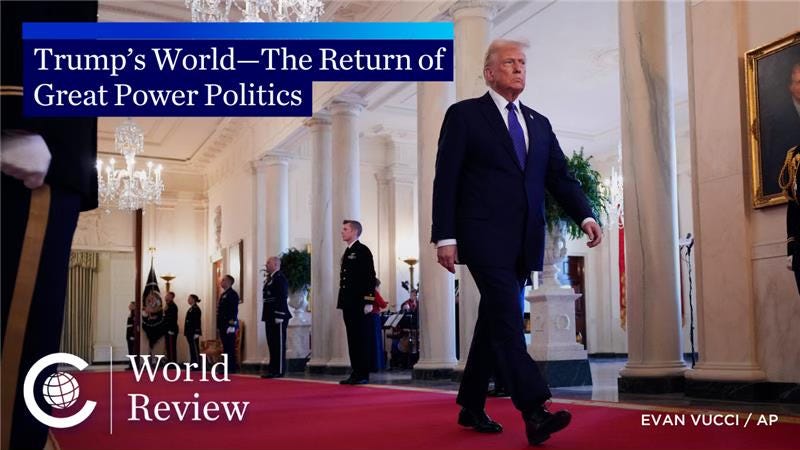World Review: Trump's World—The Return of Great Power Politics
A brief synopsis of this week's show
Each Friday morning, I host a video podcast called “World Review with Ivo Daalder” where three journalists from major news outlets around the world join me in discussing the latest global news stories of the week.
This morning, January 31, we did something slightly different—a discussion of Trump’s world view, with James Lindsay of the Council on Foreign Relations and Matt Kaminski of Politico. Rather than focusing on the big news stories of the week, we discussed two articles, one by Matt, “Trump’s World of Peril—And Opportunity”; and another by Jim and me, “The Price of Trump’s Power Politics.”
“World Review is always fascinating. I love the fact that you can get journalists from around the world to participate since zoom is the medium.”
— A Subscriber to America Abroad
While I encourage you to watch or listen to the episode (and subscribe wherever you get your podcasts!), here are a few interesting things I took away from our discussion:
Jim described Trump’s world as the end of Pax Americana—the rules-based international order that America created out of the ashes of World War II and has led ever since. Trump has long viewed this order as a burden rather than a benefit, declaring in a page-long ad in the New York Times in September 1987, that our friends and allies had played us as a sucker and the rest of the world was laughing at us. Matt argued that Trump was the first truly 21st-century president, a leader who saw the power of new technology and used it to gain and extend his power. Like many of the tech bros he has brought to Washington, Trump is a disruptor—of the federal government and of the world order. He is set on breaking a lot of crockery in the process, which can create great peril—but also offers an opportunity to shape the world more to America’s advantage.
Even in a world disrupted, it’s critical to know who are your friends and who are your foes. It’s not clear, Jim argued, that Trump has gotten this right. He admires strongmen like Russia’s Vladimir Putin and China’s Xi Jinping; he dislikes weaker allies, who he doesn’t think contribute enough and have taken America for a free ride. But we’re living in a world of great power competition, and in this world it is important that America challenges those who are competing for power and influence and keeps those who share its perspective on its side. In other words, in this competitive world, the US needs the allies and friends it has to compete with Russia and China, whereas Moscow and Beijing are seeking to divide the US and its allies. Trump is not helping by picking fights with America’s neighbors and its friends overseas.
Demand for American leadership around the world remains high, Matt suggested. Wherever he traveled over the past 12 months, leaders were looking to the United States to help defeat threats and forge solutions to common problems. America, moreover, is now in a better and more powerful position than it has been in over 20 years. Trump is comfortable with using power in ways some of his predecessors were not. That provides both leverage and opportunity. The leverage comes from using the power the US has to persuade others to follow its lead. The opportunity exists to address some big problems. A weakened Iran and remade Middle East, for example, provides America with the opportunity to address Tehran’s nuclear ambitions and regional destabilization through a negotiated deal. Trump has also surprised many on the upside in how he has addressed Ukraine so far—shining a light on Putin’s unwillingness to deal and threatening further pain if he does not. But, as Jim also argued, Trump needs to pick his fights. Threatening Panama, Colombia, and others may feel good and score points at home; it will likely weaken America’s power abroad as those threatened seek safety by aligning against Washington rather than with it.
That’s it for my quick takes of this week’s episode here on America Abroad. To get the full flavor, please listen to the episode itself.





